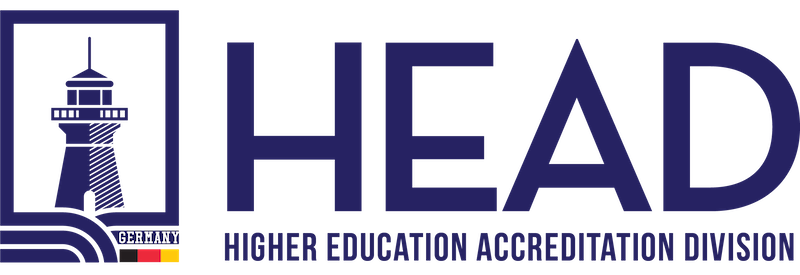HEAD Accreditation for Quality Assurance in the Higher Education Area.
Adapt the standards of Standards and Guidelines for Quality Assurance in the European Higher Education Area; European Quality Assurance Framework for Vocational Education and Training (EQAVET), ISO 21001
read moreHEAD Accreditation for Language Programs
HEAD Accreditation for Language Programs is an accreditation at programmatic levels that is focused on the language programs of higher education providers
read moreHEAD Accreditation for Academic Programs
HEAD Accreditation for Academic Programs is an accreditation at programmatic levels that is focused on the academic programs of higher education providers.
read moreHEAD – Higher Education Accreditation Division’s conduct is in accordance with the ISO/IEC 17065:2012 (Conformity assessment — Requirements for bodies certifying products, processes and services) and international regulations for higher education sector such as European Quality Assurance Framework for Vocational Education and Training (EQAVET) and Standards and Guidelines for Quality Assurance in the European Higher Education Area.
- HEAD Accreditation complements and does not substitute national recognition or accreditation. It pertains to postgraduate distance education or online programs that do not fall under the national recognition procedures and responsibilities for collaborative transnational provision. It also pertains to the accreditation of doctoral degree programs offered by universities in nations without accreditation schemes for doctorates or third-cycle programs. Accreditation from HEAD is suitable for international and collaborative university course delivery.
- Accreditation of a HEAD program does not guarantee a degree’s acceptance or recognition.
- HEAD is not authorized to confer any degrees or titles to students of accredited institutions, nor can it provide authorization related to diplomas, employment, or opening of offices. Moreover, HEAD is not responsible for monitoring or controlling any documents, certificates, diplomas, titles, degrees, rights, or authorizations issued by accredited institutions. These responsibilities and legal liabilities solely belong to the respective institution. However, HEAD conducts periodic evaluations of the educational quality and curriculum relevance of the institution and reports its findings to the relevant authorities.
- HEAD is an independent accreditation body. HEAD itself, HEAD accreditation certified, and HEAD accreditation assessment results are not a part of the German government.
- HEAD reserves the right to make any decision within our rights and responsibilities.
Context:
That national program accreditation systems are constrained by state boundaries and typically do not extend to international programs, transnational higher education, and inter-university joint, dual, and double degree programs across institutions and countries.
That university systems of self-accreditation and autonomy do not necessitate external accreditation of programs, and that accreditation is a substantiation of the quality of a program offered, is stated.
That university systems requiring recognition or authorization or national accreditation of program provision frequently exclude inter-university and trans-national program provision, in which case accreditation serves as the external verification.
Whereas
Accreditation is the procedure by which an institution undergoes a voluntary, independent evaluation of its institution or programs through institutional and programme accreditation.
So, HEAD is perfect for:
HEAD accreditation is perfect for university and higher education institution has international programs, transnational programs, and inter-university programs in any mode (face-to-face, hybrid, online). University has its higher education program locally only is not eligible to get HEAD accreditation.
An independent evaluation of an HEI’s management systems and their programs is based on HEAD stadards. The accreditation process is conduct by a group of peer-auditors, professional faculty, and academic administrators in the field of higher education.
Terms (see more in tab bellows)
Transnational Programme:
Transnational programs offered by higher education institutions in multiple countries.
Inter-University Programme:
Programs offered by numerous universities as a single, joint, dual, double, or multiple degree award.
Distance Education / Online Programme:
Programmes provided in distance education or online modus.
The awarding institution must be one of the following to pursue HEAD membership:
- a nationally recognised and accredited institution of postsecondary education with degree awarding powers;
- a state approved or licensed institution of postsecondary education with degree awarding powers;
- a legally established and operating institution of postsecondary education with degree awarding powers and with institutional accreditation by an accrediting agency recognised or listed by any government authority or board in charge of recognising accrediting agencies, or listed and recognised by CHEA, EQAR, ENQA, APQN or INQAAHE and other regional accreditation associations;
- a legally established and operating institution of postsecondary education with degree awarding powers offering programmes with programmatic accreditation by an accrediting agency recognised or listed by any government authority or board in charge of recognising accrediting agencies, or listed and recognised by CHEA, EQAR, ENQA, APQN or INQAAHE and other regional accreditation associations;
- a nationally recognized IAU-WHED (UNESCO) listed university;
- institute, schools, colleges that has graduated and postgraduated programs leads to the formal degrees from another accredited university.
The awarding institution must be one of the following to pursue HEAD accreditation:
- a nationally recognised and accredited institution of postsecondary education with degree awarding powers;
- a state approved or licensed institution of postsecondary education with degree awarding powers;
- a legally established and operating institution of postsecondary education with degree awarding powers and with institutional accreditation by an accrediting agency recognised or listed by any government authority or board in charge of recognising accrediting agencies, or listed and recognised by CHEA, EQAR, ENQA, APQN or INQAAHE and other regional accreditation associations;
- a legally established and operating institution of postsecondary education with degree awarding powers offering programmes with programmatic accreditation by an accrediting agency recognised or listed by any government authority or board in charge of recognising accrediting agencies, or listed and recognised by CHEA, EQAR, ENQA, APQN or INQAAHE and other regional accreditation associations;
- a nationally recognised IAU-WHED (UNESCO) listed university;
- Schools, and colleges that have graduated and postgraduate programs lead to formal degrees from another accredited university.
And
and to be accepted by HEAD Board of Accreditation and accepted to follow all the rules and regulations of HEAD Accreditation Standards
And
The programme comprises at least one of the following: any graduate and postgraduate program leading to the degree of Specialist, Master, or Doctor that meets one or more of the following requirements:
- The program is offered in multiple nations (transnational provision);
- Enrollment in the curriculum is open to international students.
- Distance learning or online delivery of the curriculum;
- The program is offered by multiple organizations (collaborative provision);
Institutions must submit, along with their membership application, a translation of a government-issued document from their home country demonstrating authorisation, recognition, accreditation, and/or the right to grant degrees. This documentation and additional quality substantiation, such as accreditation by national and international accrediting bodies or quality assurance organizations, must be submitted with the candidacy application.
HEAD does not offer accredited membership or program accreditation to institutions that lack national authorization, recognition, or accreditation, or degree-awarding authority.
Providers of non-degree-granting HEIs may be eligible only for validated membership and program validation.
Accreditation from HEAD is suitable for institutions worldwide that grant degrees through Transnational Programme; Inter-University Programme; distance learning and are committed to excellence.
- The institution must consent to adhere to HEAD quality standards.
- The institution must has the power to issues the degree.
- The institution must provide evidence of the caliber of its programs.
- The institution must be authorized, recognized, or accredited at the regional or national level.
- The institution must have a process for assessing prior learning and/or experience for credit conversion that includes a verification system meeting HEAD standards.
- The institution is required to provide evidence of its good faith, reputation, and ethical practices.
- The institution must administer its educational policies and admission policies without discriminating on the basis of race, religion, age, gender, sexual orientation, disability, national or ethnic origin, or sexual orientation.
Initially, membership and accreditation is valid for 01 (one) year, provided the institution remains in good standing. Renewal of accreditation is valid for 03 (three) years, conditioned on the institution’s continued excellent standing.
The Validated Membership process and procedures at HEAD consists of the following general steps:
PHASE 1 – Application form
Requesting an Application form is the first step towards validated membership process. Please submit your inquiry through our CONTACT US form or email us at support@head.com.de.
Please provide your email address, name, position or title, and the name and address of your institution.
PHASE II – Pre-Accreditation Evaluation:
Your application will be reviewed by the HEAD, and if accepted, you will be contacted for additional information, which will be analyzed in accordance with the Board of Accreditation’s eligibility policies. Following the evaluation phase, you will be informed of the fees, policies, and rules. After your acceptance, the next phase of evaluation will begin.
PHASE III – Validated Membership:
Your institution will undergo phases of external HEAD validation in which its standards will be evaluated and assessed. The institution becomes HEAD-validated membership after passing all the requirements and standards for validated membership stated above.
The accreditation procedure at HEAD consists of the following general steps:
PHASE 1 – Application form
Requesting an Application form is the first step towards accrediation process. Please submit your inquiry through our CONTACT US form or email us at support@head.com.de.
Please provide your email address, name, position or title, and the name and address of your institution.
PHASE II – Pre-Accreditation Evaluation:
Your application will be reviewed by the HEAD, and if accepted, you will be contacted for additional information, which will be analyzed in accordance with the Board of Accreditation’s eligibility policies. Following the evaluation phase, you will be informed of the fees, policies, and rules. After your acceptance, the next phase of evaluation will begin.
PHASE III – Self-Evaluation and Accreditation:
Your institution will undergo phases of self-evaluation and external HEAD audits in which its quality will be evaluated and assessed. The institutional or/and program becomes HEAD-accredited after we devote a considerable amount of time to evaluating it.
Recognition:
Recognition is mandatory. It represents an institution’s compliance to abide by the legal standards and subject itself regularly to examination by regulatory authorities in charge of higher education. As such recognition is compulsory as evidence of accountability to the public. HEAD is not a Recognition Body.
Accreditation:
Accreditation is voluntary. It represents an institution’s willingness to abide by the Standards and to open itself regularly to examination by outside evaluators familiar with higher education. As such accreditation is recognized as a symbol of accountability to the public. HEAD is an Accreditation Body.
Institutional Accreditation:
Institutional level accreditation is a process by which an accrediting agency evaluates a whole institution (such as a university or college) to determine if it meets certain standards of quality and effectiveness in its operations, academic programs, and services. The goal of institutional accreditation is to assure the public, students, and other stakeholders that the institution is operating in a manner consistent with recognized standards and that it is providing a quality education to its students.
Institutional accreditation typically involves a comprehensive review of an institution’s mission, goals, and objectives; its governance and administration; its faculty and staff; its student services; its financial resources; and its academic programs and learning outcomes. Accrediting agencies may use a variety of criteria and standards to assess an institution’s performance, including measures of student achievement and success, the quality of teaching and learning, and the institution’s commitment to diversity, equity, and inclusion.
HEAD Accreditation for Quality Assurance in the Higher Education Area is Institutional Accreditation.
Transnational Programme:
Programs provided trans-nationally in more than one country by higher education providers.
Inter-University Programme:
Programmes provided by more than one university as single, joint, dual, double or multiple degree award.
Distance Education / Online Programme:
Programmes provided in distance education or online modus.
Founding Members
Institutions of Higher Education, Universities, and Colleges that founded the HEAD Accreditation Board are Founding Members. Founding Members of HEAD are Full Members. Only Full Members are permitted to participate in Institutional Meetings and cast votes.
Institutional Members
Institutional Members consist of Quality Assurance Agencies, Accreditation Agencies, Professional Guilds and Bodies, Certification Agencies, Non-Profit Organizations, and Non-Governmental Organizations.
Validated Members:
Validated Members are Higher Education Institutions, Universities, and Colleges. Other Learning Provider Services that are interested in QM Certification and Programme Validation may register for Validated Membership. Any Higher Education Provider is allowed to submit a Validated Membership application.
Supporting Members:
Industry, government agencies, public or private for-profit organizations, excluding Institutions of Higher Education, Universities and Colleges, Quality Assurance Agencies, Accreditation Agencies, Professional Guilds and Bodies, Certification Agencies, Non-Profit Organisations, and Non-Governmental Organisations.



